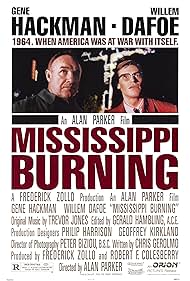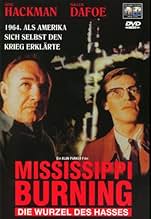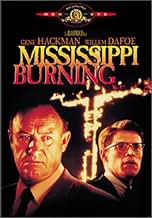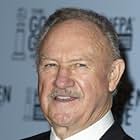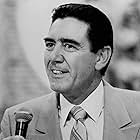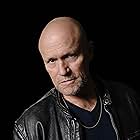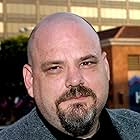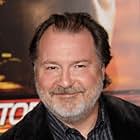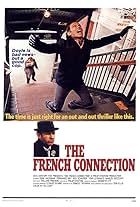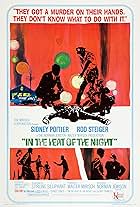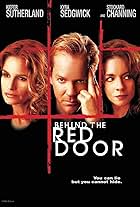Two F.B.I. Agents with wildly different styles arrive in Mississippi to investigate the disappearance of some civil rights activists.Two F.B.I. Agents with wildly different styles arrive in Mississippi to investigate the disappearance of some civil rights activists.Two F.B.I. Agents with wildly different styles arrive in Mississippi to investigate the disappearance of some civil rights activists.
- Won 1 Oscar
- 17 wins & 25 nominations total
- Judge
- (as Tom Mason)
- Director
- Writer
- All cast & crew
- Production, box office & more at IMDbPro
Storyline
Did you know
- TriviaThe film is inspired by the murder of voting rights activists James Chaney, Michael Schwerner, and Andrew Goodman by the Ku Klux Klan.
- GoofsWhen Anderson throws Pell into the chairs at the barbershop, Pell's stunt double has a different hairstyle (balding, with a comb-over).
- Quotes
Ward: Where does it come from? All this hatred?
Anderson: You know, when I was a little boy, there was an old negro farmer that lived down the road from us, name of Monroe. And he was... well, I guess he was just a little luckier than my daddy was. He bought himself a mule. That was a big deal around that town. My daddy hated that mule, 'cause his friends were always kidding him that they saw Monroe out plowing with his new mule, and Monroe was going to rent another field now he had a mule. One morning, that mule showed up dead. They poisoned the water. After that, there wasn't any mention about that mule around my daddy. It just never came up. One time, we were driving down that road, and we passed Monroe's place and we saw it was empty. He just packed up and left, I guess, he must of went up north or something. I looked over at my daddy's face. I knew he done it. He saw that I knew. He was ashamed. I guess he was ashamed. He looked at me and said, If you ain't better than a nigger, son, who are you better than?
Ward: You think that's an excuse?
Anderson: No it's not an excuse. It's just a story about my daddy.
Ward: Where's that leave you?
Anderson: My old man was just so full of hate that he didn't know that bein' poor was what was killing him.
- ConnectionsFeatured in Siskel & Ebert: The Naked Gun/Dakota/Mississippi Burning/Vincent (1988)
- SoundtracksTake My Hand Precious Lord
Words and Music by Thomas A. Dorsey
Performed by Mahalia Jackson
Courtesy of CBS Records
This film is bit like JFK in a way. It is not an absolute recreation of the events that took place in 1964, but it is a film that tells a true story and then adds a bit of fiction to make it more interesting for a mass audience. For example, the case was not cracked by Mr. Anderson fooling around with Pell's wife. But that is besides the point, the point being that this film is mesmerizing. Everything from its direction, cinematography, acting, writing and music, it is the best film of 1988. And having Rain Man take most of the major awards is really quite sad. Because Mississippi Burning is much more ambitious, important and well done. Rain Man is a very good film and I will even go as far as to say that Hoffman is the only one that deserved to win best actor just as much as Hackman did. But 1988 was a bad year for the rest of the Oscars. Anyway...
I have been edgy before. Boyz and the Hood did that to me, but this film makes me angry. It makes me want to jump back into 1964 and try to do something to stop this. The film is that strong at showing us how terrible and pointless racism is. And in order to make this film work, there has to be strong elements in all areas. But for me, what really made me feel the things that I did is the actors that played their roles.
Hackman is brilliant. He gives the performance of a lifetime and it is his anger that gives him his edge. He sees things differently than Mr. Ward does and that sometimes makes them bump heads with each other. But they ultimately have the same goal in mind. Just different ways of achieving that goal. Dafoe is great as well, but it is the supporting cast that really makes this film. From Dourif to R. Lee Ermey to Stephen Tobolwolski, these characters are richly portrayed by the actors that play them. There is however one actor in particular that I wanted to touch on and that is Michael Rooker. He plays Frank, the nastiest, meanest, no conscience, negro hating person that I think I have ever seen on film. I don't know where his anger comes from, but he is the kind of character that you can imagine had a violent father that drank too much and always told stories about how bad the black man was. When Rooker is on screen you listen. You pay attention to what he is saying and doing. And my hatred of him was one of my favourite parts of the film.
Mississippi Burning shows us how strange people are when it comes to racism. The characters in this film don't know why they hate the way they do, they just know that they do. And they are powerless to stop themselves. What happened to the three civil rights workers was a disgrace and a tragedy. But not just because three boys were murdered, but because no one knows why they were murdered,besides racism that is. Why did they have to die? Because they were a different colour of skin? Because they were Jewish? It really doesn't make any sense.
Mississippi Burning is one of the best films I have ever seen. It is important and it is entertaining. If you haven't seen it, do so just for the scene with Mr. Anderson and Deputy Pell at the barber shop. That is worth the price of the rental alone. But for a really important film that has something to say, this is one of the best.
- How long is Mississippi Burning?Powered by Alexa
Details
Box office
- Budget
- $15,000,000 (estimated)
- Gross US & Canada
- $34,603,943
- Opening weekend US & Canada
- $225,034
- Dec 11, 1988
- Gross worldwide
- $34,603,943
Contribute to this page

